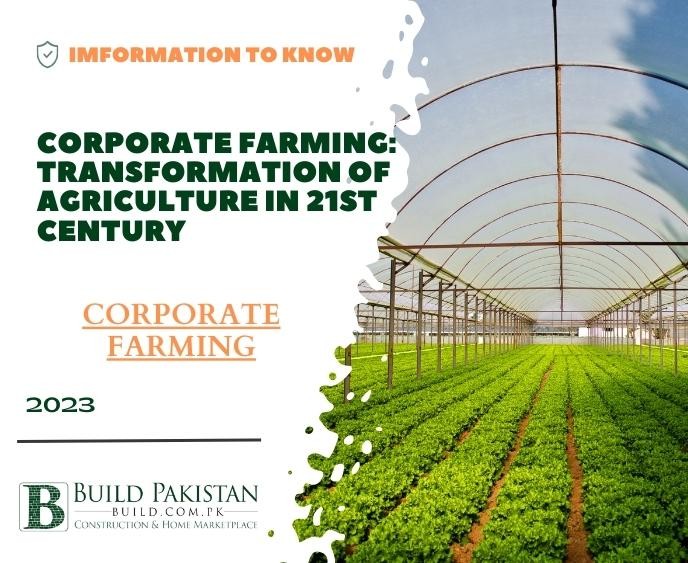Corporate Farming: Transformation of Agriculture in 21st Century

Introduction:
Agriculture has been a cornerstone of human
civilization for millennia, providing sustenance and livelihoods to communities
around the world. However, the agricultural landscape is evolving rapidly, with
corporate farming emerging as a defining force in the 21st century. In this
extensive blog, we will explore the concept of corporate farming, its
far-reaching impacts on the agricultural sector, the challenges it poses, and
the potential benefits it offers.
Defining Corporate Farming:
Corporate farming, also known as
agribusiness, refers to large-scale, commercial agricultural operations owned
and managed by corporations or conglomerates rather than individual farmers or
families. These entities often control vast expanses of farmland and employ advanced
technologies and management practices to maximize agricultural output and
profitability. Corporate farming can encompass various aspects of agriculture,
from crop cultivation and livestock production to agri-processing and
distribution.
The Rise of Corporate Farming
The shift towards corporate
farming has been driven by several factors:
Economies of Scale:
Large-scale farming operations benefit
from economies of scale, allowing them to produce more efficiently and
cost-effectively than smaller farms. This often leads to increased food
production.
Technological Advancements:
Corporations invest heavily in
agricultural technology, leveraging innovations such as precision farming,
genetically modified organisms (GMOs), and automation to enhance productivity
and reduce resource usage.
Globalization:
The globalization of agriculture has created
opportunities for corporations to ex pand their operations across borders,
facilitating the movement of agricultural products worldwide.
Market Integration:
Corporate farming has contributed to
greater integration within the global food supply chain, connecting producers,
processors, and consumers more efficiently.
Advantages of Corporate Farming
Corporate farming offers
several advantages:
Increased Productivity:
Large-scale operations can
significantly increase agricultural output, helping meet the demands of a
growing global population.
Technological Innovation:
Corporations invest in research and
development, leading to innovations that benefit the entire agricultural
sector.
Market Stability:
Corporate farms can better manage market
fluctuations and supply chain disruptions, contributing to food security.
Job Creation:
Large agricultural operations often create jobs
in rural areas, stimulating local economies.
Challenges of Corporate Farming
However, corporate farming
also poses several challenges:
Land Consolidation:
Corporate farms may lead to the
consolidation of farmland, reducing the number o f small family-owned farms and
potentially creating land monopolies.
Environmental Concerns:
Intensive farming practices
associated with corporate agriculture can result in environmental issues,
including soil degradation, water pollution, and overuse of resources.
Loss of Local Control:
Corporate farms may prioritize profits
over local needs, potentially leading to monoculture farming and reduced
biodiversity.
Market Dominance:
Some critics argue that large
agribusinesses can have excessive market influence, which may harm smaller
producers and limit consumer choice.
Impact on the Agriculture Sector
The rise of corporate
farming has had a profound impact on the agriculture sector:
Increased Productivity:
Corporate farms have contributed to
increased agricultural productivity, helping meet the growing global demand for
food.
Technology Transfer:
Corporations invest in research and
development, leading to innovations that benefit agriculture as a whole.
Market Integration:
Corporate farming has led to greater
integration within the global food supply chain, facilitating the movement of
agricultural products worldwide.
Environmental Stewardship:
Some corporate farms prioritize
sustainable and environmentally friendly practices, setting industry standards
for responsible agriculture.
Challenges for Small Farmers
Smaller, family-owned farms face increased competition and may need to adapt to survive in a changing agricultural landscape. Future Prospects of Corporate Farming: The future of corporate farming will be influenced by various factors:
Sustainability:
As concerns about climate change and
environmental impact grow, corporate farms may increasingly adopt sustainable
and regenerative practices.
Technology Advancements:
Continued technological innovations,
such as artificial intelligence and automation, may further increase
productivity and efficiency.
Consumer Demand:
Consumer preferences for locally sourced,
organic, and ethically produced food may influence corporate farming practices.
Government Policies:
Agricultural policies and regulations
can significantly impact the growth and practices of corporate farming.
Global Food Security:
The role of corporate farming in
ensuring global food security will continue to be crucial, especially as the
world population increases.
Conclusion:
Corporate farming is a complex and evolving facet of modern agriculture. While it offers advantages in terms of efficiency and productivity, it also presents challenges related to land consolidation, environmental impact, and market dominance. The future of corporate farming will depend on its ability to adapt to changing consumer demands, technological advancements, and sustainable practices while addressing the concerns raised by critics. Ultimately, the success of corporate farming will play a vital role in shaping the world's food production and ensuring food security for the planet's growing population









